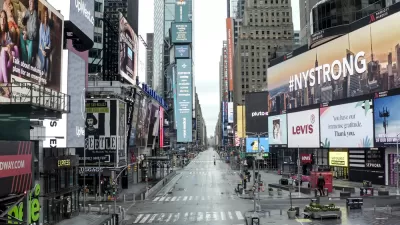Accelerated investment in smart city technologies presents increased opportunity for connection and data-driven decision making, so long as cities can avoid the common pitfalls of implementation.

In the opinion and experience of planning professionals and city authorities, the coronavirus pandemic is shifting cities' priorities toward digitalization and the adoption of smart city technologies. As Lara Williams puts it: "The pandemic has highlighted the need for accelerated digital city planning and greater communication with citizens for such population levels to be sustainable."
Cities like London and Vancouver are accelerating and repurposing in-progress projects to enable the collection of data that can inform data-driven decisions in response to the coronavirus crisis. According to Williams, cities are also investing in technologies to connect remote workers. In Vancouver, for example, with the implementation of LED street lighting systems and a shift to remote work infrastructure, the city predicts significant post-pandemic savings in the midst of an economic downturn.
Understanding the role of digitization in cities large and small is an increasingly ubiquitous priority for city authorities and infrastructure owners. Williams says, however, that cities should take test runs before implementing massive changes and that, "small pilots leading to scalable solutions with an organic approach are preferable to sweeping policy changes."
Another consideration for city authorities considering the implementation of new technologies: prioritize data privacy and digital citizenship as part of the process, making sure every member of the community has equal access to prerequisites for using the technology, including knowledge of how the systems function.
FULL STORY: How Covid-19 is shifting 'smart city' priorities

Maui's Vacation Rental Debate Turns Ugly
Verbal attacks, misinformation campaigns and fistfights plague a high-stakes debate to convert thousands of vacation rentals into long-term housing.

Planetizen Federal Action Tracker
A weekly monitor of how Trump’s orders and actions are impacting planners and planning in America.

In Urban Planning, AI Prompting Could be the New Design Thinking
Creativity has long been key to great urban design. What if we see AI as our new creative partner?

King County Supportive Housing Program Offers Hope for Unhoused Residents
The county is taking a ‘Housing First’ approach that prioritizes getting people into housing, then offering wraparound supportive services.

Researchers Use AI to Get Clearer Picture of US Housing
Analysts are using artificial intelligence to supercharge their research by allowing them to comb through data faster. Though these AI tools can be error prone, they save time and housing researchers are optimistic about the future.

Making Shared Micromobility More Inclusive
Cities and shared mobility system operators can do more to include people with disabilities in planning and operations, per a new report.
Urban Design for Planners 1: Software Tools
This six-course series explores essential urban design concepts using open source software and equips planners with the tools they need to participate fully in the urban design process.
Planning for Universal Design
Learn the tools for implementing Universal Design in planning regulations.
planning NEXT
Appalachian Highlands Housing Partners
Mpact (founded as Rail~Volution)
City of Camden Redevelopment Agency
City of Astoria
City of Portland
City of Laramie





























